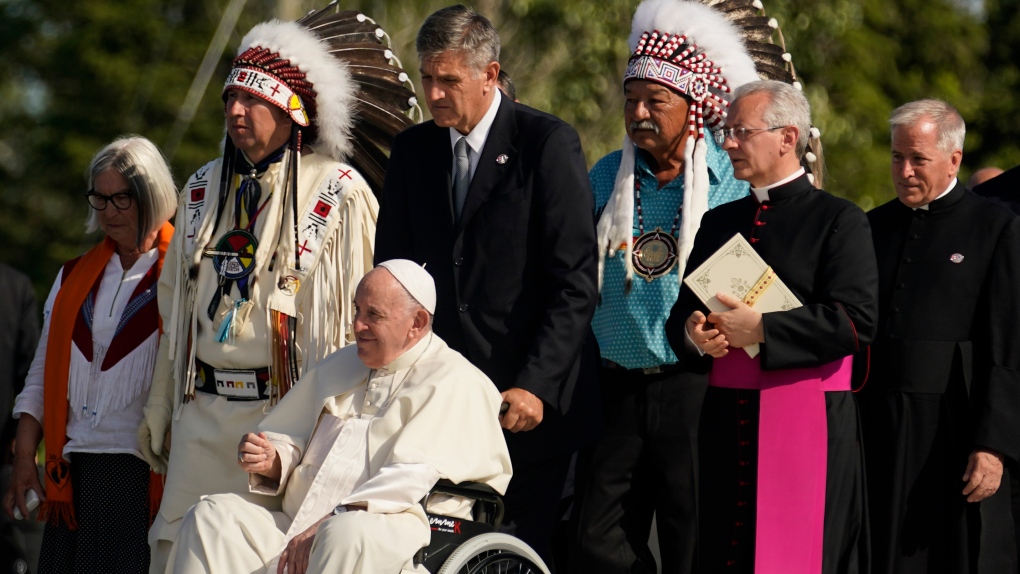'A long time coming': Edmonton Catholics commit $3.2M to Indigenous reconciliation fund
 Pope Francis arrives the Lac Ste. Anne pilgrimage site in Alberta, Canada, Tuesday, July 26, 2022. Pope Francis traveled to Canada to apologize to Indigenous peoples for the abuses committed by Catholic missionaries in the country's notorious residential schools. (AP Photo/Eric Gay)
Pope Francis arrives the Lac Ste. Anne pilgrimage site in Alberta, Canada, Tuesday, July 26, 2022. Pope Francis traveled to Canada to apologize to Indigenous peoples for the abuses committed by Catholic missionaries in the country's notorious residential schools. (AP Photo/Eric Gay)
The Archdiocese of Edmonton will spend $3.2 million on reconciliation initiatives with First Nations, Métis and Inuit people in the Alberta capital region.
The money is part of the Indigenous Reconciliation Fund, a national effort totalling $30 million over five years.
There are five pillars of the plan: healing and reconciliation, youth leadership, culture and language revitalization, education and community building, and dialogues for promoting Indigenous spirituality and culture.
Committee chair Cam Alexis says reconciliation with the church is long overdue.
He is a former Chief of the Alexis Nakota Sioux Nation and former Regional Chief with the Assembly of First Nations.
Alexis believes money can't change the past but initiatives like this can help create a better future.
"It was a long time coming. But you know what? The signal is that we need to move forward and there is some funding provided and that funding will help promote and perhaps offer some healing mechanisms for our people," he told CTV News Edmonton.
Last summer, Pope Francis travelled to Canada, and in Alberta delivered an apology to Indigenous people for the church's role in residential schools and the traumas experienced in them.
Francis followed that up in March by formally rejecting the "Doctrine of Discovery," stating it "did not adequately reflect the equal dignity and rights of Indigenous peoples."
That was a statement many Indigenous people were calling for and one an assistant professor from the Ermineskin Cree Nation called "a humongous symbolic victory."
An Indigenous-led committee has been assembled to award the $3.2 million.
Applications will be accepted for three months on the Catholic Archdiocese of Edmonton website.
With files from CTV News Edmonton's Brittany Ekelund
CTVNews.ca Top Stories

BREAKING King Charles' cancer treatment progressing well, says Buckingham Palace
King Charles III’s doctors are 'sufficiently pleased' with his cancer treatment and he is expected to return to public-facing duties, Buckingham Palace announced on Friday.
BREAKING Orca calf that was trapped in B.C. lagoon for weeks swims free
An orca whale calf that has been stranded in a B.C. lagoon for weeks after her pregnant mother died swam out on her own early Friday morning.
'Unacceptable': Trudeau reacts after AFN chief says headdress taken from plane cabin
After the Assembly of First Nations' national chief said her headdress was taken from an airplane cabin this week, Prime Minister Justin Trudeau called the incident 'unacceptable' and a 'mistake' on the part of Air Canada.
DEVELOPING Bird flu outbreaks: WHO weighs in on public health risk
The World Health Organization said on Friday that the current overall public health risk posed by H5N1 bird flu virus is low, but for those with exposure to infected birds or animals the risk of infection is considered low-to-moderate.
Sophie Gregoire Trudeau on navigating post-political life, co-parenting and freedom
Sophie Gregoire Trudeau says there is 'still so much love' between her and Prime Minister Justin Trudeau, as they navigate their post-separation relationship co-parenting their three children.
From faulty kids' cribs to flammable kids' bathrobes, here are the recalls of the week
Health Canada issued recalls for various items this week, including kids’ bathrobes, cribs and henna cones.
Taylor Swift dons Montreal designer's dress in 'Fortnight' video
A pair of Montreal designers' work has now been viewed over 41 million times. Taylor Swift dons a Victorian throwback black gown in her latest music video, 'Fortnight', designed by UNTTLD due Simon Belanger and Jose Manuel Saint-Jacques.
'Too young to have breast cancer': Rates among young Canadian women rising
Breast cancer rates are rising in Canada among women in their 20s, 30s and 40s, according to research by the University of Ottawa (uOttawa).
'Violation': CSIS had officer investigated after she reported a superior raped her
A CSIS officer's allegations that she was raped repeatedly by a superior in agency vehicles set off a harassment inquiry, but also triggered an investigation into her that concluded the alleged attacks were a “misuse” of agency vehicles by the woman.































